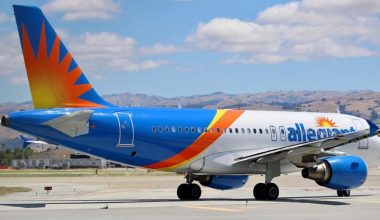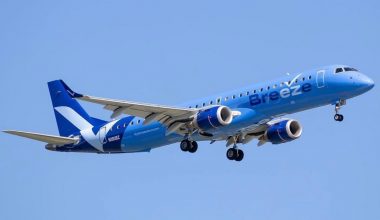Since the early days of commercial air operations, there have been several headwinds facing the aviation industry. Despite several setbacks, the aviation industry continues to take off to new heights daily. As the air sector drives exponential growth in travel, tourism, and the economy, it’s an ideal decision to set a career in aviation- one of the world’s most booming and important economic industries. A Bachelor of Aviation is one of the most sought-after degrees for those who aspire to launch their career in the aviation industry.
With the introduction of new aviation technologies, as plane makers are relentlessly driving for further air advancements, the world is becoming more mobile, offering plenty of career scope in aviation. If aviation is your passion, the Bachelor of Aviation course will help you pave the path to your flying career and propel your professional ambitions to a new height.

Bachelor of Aviation- course outline
Bachelor of Aviation is a multi-year undergraduate degree for studies within the aviation industry, including engineering, electronics, aircraft maintenance, flight operations, airport management, etc. Depending on the country and the university, the timeframe for completing this course of study varies from three to six years. In the United States, a Bachelor of Aviation is usually a four-year degree course extending up to six years in some cases (depending on the institution).
Unlike other common university degrees, a Bachelor of Aviation is highly technical and entails a very specific area of study. The program covers a good breadth of the underlying science and technology behind aviation along with solid academic and theoretical grounding in general aspects of the air industry related to safety and aviation management. The course provides professional education and a broad skill-set with graduate status to prepare students for a career in the airlines. It integrates academic contents (with fundamental knowledge in aerodynamics, meteorology, navigation, aircraft systems, flight planning, safety management, etc.) and industry placements to reflect aviation operations’ dynamic and multi-faceted nature. Developing the specialized knowledge and skills needed for lifelong learning in evolving aviation environment, you will graduate with a broader understanding of the aviation sector, ready to take on industry leadership roles.

While there are multiple areas of concentration within this course, Bachelor of Aviation students will get themselves familiarized with such aviation-related pursuits as:
Also Read: Is pilot training a degree course? How to become pilot ?
- Science behind flying
- Aircraft maintenance
- Airport management, human factors, safety management systems
- Aircraft power plants and systems
- Aerodynamics, meteorology, navigation
- Air freight and air traffic management, airline and airport economics
- Laws relevant to aviation, multi-crew environment
- Finance, marketing, risk assessment, strategic leadership, etc.
Bachelor of Aviation: For whom?
One of the important questions is ‘Who is this course targeted to?’ The Bachelor of Aviation degree course is designed for those who seek to pursue a career in diverse fields of the aviation industry, including pilots, air traffic control, airport and airline management, aviation business, flight dispatcher, flight instructor, airline crew support, and more.
Given a wide variety of concentrations in aviation degrees, you can specify the field of study to major in depending on the career path you seek to pursue. If you love flying, the Bachelor of Aviation degree designed specifically to train pilots will help you develop the in-depth theoretical and technical knowledge and skills required to take your journey off the ground. The Bachelor of Aviation (Pilot) covers the aviation theory based on the Commercial Pilot and Airline Transport Pilot syllabus and hands-on, practical training on state-of-the-art flight simulators.
Similarly, suppose your dream is to become an air traffic controller. In that case, you can enroll in a Bachelor of Aviation degree in air traffic management, which involves real-time risk analysis, situational awareness, rigorous physical and psychological testing, numeric computations and mathematics, etc.

Some universities also offer Bachelor of Aviation courses with a major in Airline and Airport Operations to suit students’ interest in the airline industry and provide real-world skills and core theoretical foundations of aviation operational management to prepare them to become aviation professionals.
Earning a Bachelor of Aviation degree is beneficial for every person who wants a flying start to his/her aviation career: From the pilot to aerospace engineer to air traffic controller to flight instructor to airport security.
Top-notch aviation degrees
In line with the multi-faceted nature of aviation, universities offer various types of aviation programs. Some of the top-notch aviation degrees include:
- Bachelor of Aviation
- Bachelor of Science in Aviation Technology-specializes in flight training, aircraft maintenance, aircraft systems, aerodynamics, and other facets of physics
- Bachelor in Professional Flight Management
- Bachelor in Airframe and Power Plant Technology
- Bachelor of Science in Aerospace Engineering
- Bachelor of Science in Air Traffic Management
- Bachelor in Aviation Management
Many aviation degrees are accompanied by flight training to complete the flying licenses and ratings required to become a professional pilot and give a competitive edge to students. Pilot-related aviation degree programs include commercial pilot theory content and learning from academics, industry experts, and flight instructors.
Why pursue a Bachelor of Aviation degree?
Bachelor’s degree in aviation is a technical-oriented program that is highly regarded in the US and other countries more than certificates. Unlike licensures and certificates, a Bachelor of Aviation degree is a lifelong entitlement and demonstrates your determination, motivation, and willingness to learn. It helps you realize your self-worth and gives you a strong sense of responsibility, self-discipline, and strong communication and decision-making skills.
Also Read: How much do private pilots make?
Some of the reasons for pursuing a Bachelor’s degree in aviation are listed below:
1. It is a versatile degree that bestows its recipients with an in-depth understanding of air operations and prepares them for careers in the aviation industry.
2. In addition to advanced professional education, the degree course also offers the opportunity to apply knowledge in the relevant work environment through internships and industry placements.
3. With many airlines specifying a four-year degree as a minimum requirement for the job, a Bachelor of Aviation degree makes you a more attractive employee prospect and increases your chances of getting hired.

4. As it is a lifelong entitlement, you can always have a backup plan if something doesn’t work out. E.g., if you become physically unfit to qualify for the commercial pilot license, holding a degree in the aviation field will help you fall back on another career path and use transferable knowledge and skills gained to move into other sectors in aviation.
5. Most civil aviation authorities do not necessitate a four-year degree for an airline pilot, but given the competitive nature of aviation jobs, acquiring a Bachelor of Aviation degree will make a plus point and keep your application at the top of the stack when applying for the airline job.
6. The career choice in the aviation industry is diverse, so earning a degree in a related field will let you explore a wide array of aviation careers and apply to other industry jobs as circumstances change.
7. The universities and colleges offering Bachelor’s degrees in aviation have extensive industry connections to give their students real-world skills and contacts. They enjoy strong industry ties as a part of collaboration and partnerships with air companies worldwide. The chances of getting jobs right after graduation are high since universities can hook you up with airlines they have connections to.
Bachelor of Aviation requirements
The Bachelor’s degree in aviation is a highly-rewarding undergraduate program with certain requirements. Most foreign universities require Higher Secondary Certificate (+2 certificate) or Proficiency Certificate to get enrollment in this course. Furthermore, international students or those who undertook previous study in a non-English language must comply with English language requirements before getting admittance to the university. Like any other academic course, universities set specific enrollment requirements for Bachelor of Aviation Courses.
Bachelor of Aviation fees
The fees incurred in pursuing a Bachelor of Aviation degree are different for each university and the area of aviation you would like to study. For instance, a degree in a professional pilot is more expensive than a degree in other fields of aviation such as meteorology, safety management, airline operations, aeronautic engineering, etc. In the US, Bachelor of Aviation fees can be as low as $50000 or as high as $100000 or +.

Institutions offering Bachelor of Aviation programs in the US
The United States of America is a go-to place for studying aviation as there are hundreds of universities and colleges specializing in aviation degrees. Some of the top universities offering degree programs in aviation in the US are Arizona State University, Utah State University, the University of Nebraska at Omaha, Bowling Green State University, Ohio State University, Delaware State University, San Jose State University, etc.
Similarly, there are a handful of community colleges and smaller schools providing undergraduate degree programs in aviation, such as Colorado Northwestern Community College, The Community College of Baltimore, Dutchess Community College, Salt Lake Community College, Embry Riddle-Aeronautical University-Daytona Beach, Florida Institute of Technology, Fox Valley Technical College, etc.






